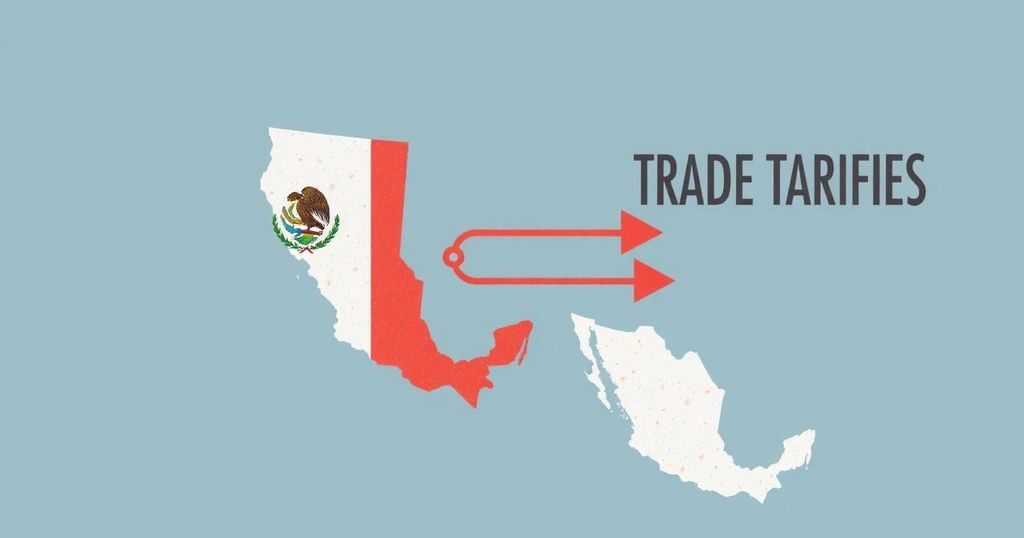Trump’s Imposition of New Tariffs on Mexico and Canada Raises Concerns
President Trump is set to impose a 25% tariff on exports from Mexico and Canada, despite reducing illegal migration and drug trafficking. This move leads to potential economic fallout and retaliatory actions from both countries. The tariffs aim to decrease reliance on foreign goods, while concerns over rising prices and inflation loom.
On Monday, President Donald Trump announced that a new 25% tariff would be imposed on exports from Mexico and Canada, despite prior evidence that both nations had taken significant actions to reduce illegal migration and drug trafficking. He stated, “The tariffs, you know, they’re all set,” indicating that this levy would come into effect the following day.
Following this announcement, all major U.S. stock indexes experienced significant declines. Economists predict that the tariffs could negatively affect the economies of all three countries, leading to decreased U.S. demand for Mexican and Canadian products, and subsequently elevating prices for American consumers and businesses.
In response to the tariffs, both Mexican President Claudia Sheinbaum and Canadian Prime Minister Justin Trudeau expressed the possibility of retaliatory tariffs on U.S. exports. Initially, Trump attributed the necessity of these tariffs to inadequate measures by Mexico and Canada in addressing illegal migration and drug trafficking, particularly concerning fentanyl.
Despite the impending tariffs, U.S. Commerce Secretary Howard Lutnick remarked that while illegal crossings have reached a historic low, the issue of fentanyl remains unaddressed. He noted, “The Mexicans and the Canadians have done a nice job on the borders,” but emphasized the need for further action on fentanyl regulation.
In conjunction with the tariffs on Mexico and Canada, Trump is also set to impose a 10% tariff on Chinese goods, aiming to combat fentanyl trafficking from China. Sheinbaum dispatched 10,000 troops to the U.S.-Mexico border, while Trudeau appointed a “fentanyl czar” to tackle drug issues and border policing.
Trump had previously stated on his Truth Social platform that, “Drugs are still pouring into our Country from Mexico and Canada at very high and unacceptable levels.” Economists predict that these tariffs will raise retail prices for consumers and production costs for businesses, as Mexico, Canada, and China are the three largest trading partners of the U.S.
Moreover, during a recent Cabinet meeting, Trump mentioned an impending 25% tariff on EU exports to the U.S., leading to a firm response from the EU, which hinted at retaliatory tariffs against U.S. imports. Trump stated that reciprocal tariffs would be implemented against nations that levy taxes on U.S. exports, hinting at further tariffs on various imports.
Many economists have warned that the tariffs could trigger an inflationary spike within the U.S. economy. Although Trump acknowledged potential short-term difficulties, he maintained that these tariffs are ultimately aimed at bolstering domestic manufacturing within the United States to circumvent international tariffs on exports.
In summary, President Trump’s decision to impose a 25% tariff on exports from Mexico and Canada may have significant economic repercussions, including potential price increases for consumers and businesses. Both countries threatened retaliation, emphasizing the ongoing tensions surrounding trade policies. In addition to these tariffs, a new tax on Chinese goods is also expected. The long-term implications of these moves await to be seen, particularly regarding inflation and U.S.-Mexico-Canada trade relations.
Original Source: www.voanews.com




Post Comment